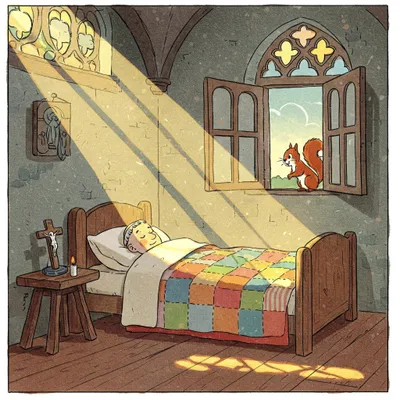Frere Jacques

Lyrics
Dormez-vous? Dormez-vous?
Sonnez les matines! Sonnez les matines!
Din, din, don. Din, din, don.
[And in English:]
Are you sleeping
Are you sleeping?
Brother John
Brother John?
Morning bells are ringing!
Morning bells are ringing!
Ding dang dong
Ding dang dong
History and Meaning
Lyrics Meaning
Frère Jacques, Frère Jacques, (Brother Jacques, Brother Jacques - referring to a monk named Jacques)
Dormez-vous? Dormez-vous? (Are you sleeping? Are you sleeping? - asking if the monk is still asleep)
Sonnez les matines! Sonnez les matines! (Ring the morning bells! Ring the morning bells! - urging the monk to wake up and ring the bells for morning prayers)
Ding, dang, dong. Ding, dang, dong. (The sound of the bells ringing)
History
Frère Jacques, also known as Brother John in English, is a French nursery rhyme about a monk named Jacques who has overslept and needs to wake up to ring the morning prayer bells. The song is often sung in rounds and has become a classic children's song in both French and English.
The origins of the lyrics are uncertain, with various theories proposed. One popular theory suggests that the song was written about Frère Jacques Baulot, although there is no historical evidence to support this claim. Other theories propose political motives behind the lyrics, but these also lack supporting evidence.
The French National Library holds a rare manuscript by composer Jean-Philippe Rameau containing the melody for Frère Jacques, which has led many to consider him the originator of the song. The first version of the song, titled Frère Blaise, was published later in the 18th century with the melody intact but no lyrics. The song was not published as Frère Jacques with its current lyrics until 1860.
The English version, Brother John, emerged in the 19th century due to the popularity of children's nursery rhymes in England. Although it appeared after the first Mother Goose fairytale books, Brother John quickly became an international favourite, regardless of the language in which it was published or sung.
The earliest printed version of the melody is on a French manuscript circa 1780 (manuscript 300 in the manuscript collection of the Bibliothèque Nationale in Paris), titled "Recueil de Timbres de Vaudevilles." Sheet music collector James Fuld (1916–2008) states that the tune was first published in 1811, and the words and music were published together in Paris in 1869.